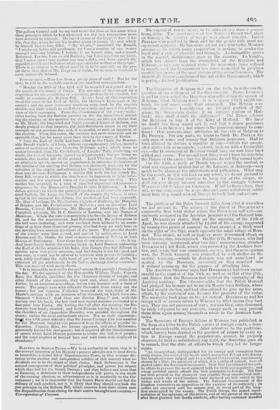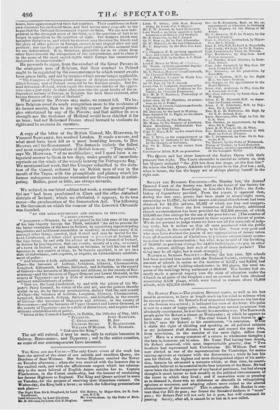The Austrian Observer says, that DWERNICIZI had been unsuc- cessful
in the combat, of the 1 eth as well aS in that of the 27th; and denies that the Russians first violated the neutrality of the Austrian territory. The Observer adds, that the Polish General had pledged his honour not to invade Russia front Gallicia, where he had sought shelter, and had also offered to give up his arms, which, by the custom of war, 1.,eninse the property of the victor. The surrender took place on the 1st instant. DWERNICKI and his troops will of course return to Warsaw by what means they best can. They are not prisoners of war ; nor can they, once disarmed, be fairly subjected to any restraint, except such as may prevent them from again arming themselves while in the Austrian terri- tories.
The Secretary of Foreign Affairs at Warsaw has published, in the form of a letter to the Polish agents at foreign courts, a docu- ment of considerable interest. After adverting to the partitions, which, having been decried as the greatest of crimes by every na- tion in Europe except the perpetrators, cannot, he properly observes, be held as establishing any right, the Secretary goes on to remark, that the state of affairs to which they led no longer exists.
"An insurrection, distinguished for its energy and exemption from every excess, has severed tile bonds which connected Poland with Russia. The kingdom is now subject only to a national Government, unanimously chosen by a Diet, the members of which, it is worthy of remark, were all elected under the Russian Government. That Diet has intrusted the pub- lic affairs to persons the most eminent both for birth and popularity, and whose political career affords the best guarantee to Europe. The Diet has thus secured in the strongest way possible those monarchical insti- tutions which the two Chambers have declared are best suited to the wishes and wants of the nation. The National Government of the kingdom encounters no opposition in the exercise of its authority ; its orders are executed with the utmost zeal, in every part of the king- dom unoccupied by the enemy. The Polish troops, the armed repre- sentation of the opinions, of the desires, and of the power of the nation, after three glorious but deadly conflicts, after having sustained dreadful losses, have again completed their full numbers. Their confidence in their own resources has increased them, and that heroic army responds to the hopes that the National Government reposes in them. We are now inde- pendent in the strongest sense of the term, aial the question of fact is no longer in opposition to the question of right. The dangers which may hereafter threaten us, and which to-morrow may threaten the liberty and the glory of other powers in Europe, cannot in any respect alter our real position ; nor can they prevent us from proclaiming at this moment that we are independent. It is, therefore, admissible for us to claim from other Governments the recognition of our independence, and to claim it in the name of the most sacred rights which Europe has unanimously declared to be imperishable." He proceeds to argue, from the conduct of the Great Powers in the analogous case of Belgium, that their conduct to Poland ought to be regulated by the circumstances to which recent events have given birth, and not by treaties which are no longer applicable.
"The Congress of Vienna could dispose of Belgium conquered by the Allied Powers, and of Poland occupied by the Russian armies. But Po- land delivered—Poland, which repels the numerous hordes of the aggres- sors—has a just right to claim admission into the great family of the in- dependent nations of Europe, as Belgium has been there received, after having thrown off the yoke of Holland."
What answer the Powers may make, we cannot tell. We be- lieve Belgium owed its ready recognition more to the weakness of its former master, than to any mighty respect for general princi- ples entertained by any of the Powers; and that neither its own strength nor the weakness of Holland would have shielded it for an hour, had not Reformed France stood forward to vindicate its rights and to overawe its enemies.



























 Previous page
Previous page